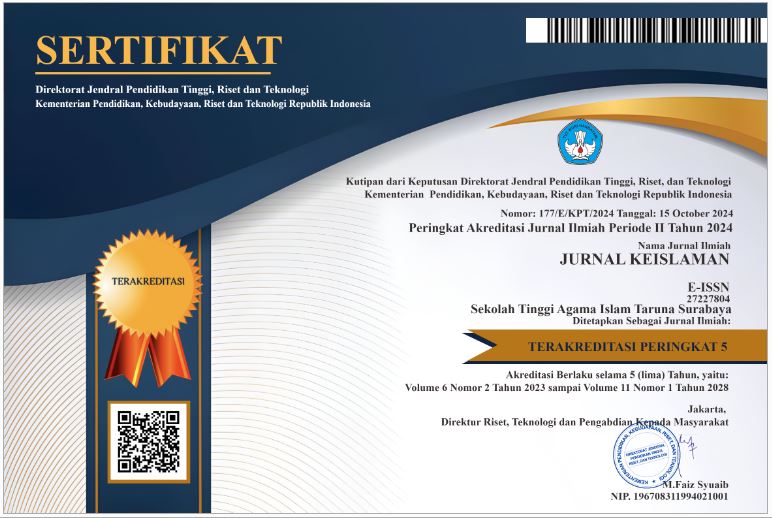Humanisasi Pengemis dalam Perspektif Yusuf al-Qaradhawi
DOI:
https://doi.org/10.54298/jk.v8i2.619Keywords:
Humanization of beggars, economic empowerment, social policy, Yusuf al-Qardawi, social justiceAbstract
The phenomenon of beggars is a complex social problem, especially in a country with a Muslim majority. Islam views poverty as a problem that must be overcome with the principles of social justice and economic empowerment. This study aims to examine Yusuf al-Qadawi's thoughts on the humanization of beggars from an Islamic perspective, which includes the empowerment of beggars, the role of the state in the fair distribution of wealth, and social rehabilitation approaches. This study uses a literature study method by analyzing books, articles, and scientific works that discuss al-Qardawi thought and social justice in Islam. The results of the study show that al-Qardawi emphasizes the empowerment of beggars through skills training and the provision of business capital, not just material assistance. Al-Qardawi also proposed that the state play a role as a facilitator in the policy of equitable distribution of wealth, to reduce social inequality and provide economic opportunities to the poor. This study concludes that al-Qardawi thought provides a sustainable solution in overcoming poverty by prioritizing empowerment and social integration. This approach shows that Islam offers practical solutions to social problems with more holistic principles of social justice and empowerment.
Downloads
References
Abdussamad, Z. (2021). Metode Penelitian Kualitatif. CV. Syakir Media Press.
Adilla, M. S. (2023). Solusi Islam dalam Pengentasan Kemiskinan menurut Yusuf Qardhawi. El-Mujtama: Jurnal Pengabdian Masyarakat, 4(2), 1180–1190. https://doi.org/10.47467/elmujtama.v4i2.4991
Aeni, N. (2021). Respon Agama terhadap Kemiskinan: Perspektif Sosiologi. Jurnal Sosiologi Agama Indonesia (JSAI), 2(1). https://doi.org/10.22373/jsai.v2i1.1260
Alkaf, F. Z. (2015). Bimbingan Bagi Gelandangan Dan Pengemis Dalam Menumbuhkan Self-Determination Di Panti Sosial Bina Karya (PSBK) Yogyakarta [Skripsi, Universitas Islam Negeri Sunan Kaliga Yogyakarta]. https://digilib.uin-suka.ac.id/id/eprint/16572/2/11220001_bab-i_iv-atau-v_daftar-pustaka.pdf?utm_source=
Aprianto, N. E. K. (2016). Kebijakan Distribusi Dalam Pembangunan Ekonomi Islam. Al-Amwal Jurnal Kajian Ekonomi dan Perbankan Syariah, 8(2). https://doi.org/10.24235/amwal.v8i2.990
Aprianto, N. E. K. (2018). Kemiskinan Dalam Perspektif Ekonomi Politik Islam. ISLAMICONOMIC: Jurnal Ekonomi Islam, 8(2). https://doi.org/10.32678/ijei.v8i2.60
Azimi, Z. (2024). Motivasi Dalam Islam. Jurnal Tahqiqa : Jurnal Ilmiah Pemikiran Hukum Islam, 18(1), 61–69. https://doi.org/10.61393/tahqiqa.v18i1.209
Budiman, A., Busro, B., & Rasyid, A. F. (2023). Analisis Spirit Filantropi Islam Perspektif Aksiologi Max Scheler dalam Konteks Badan Amil Zakat Nasional. Jurnal Bimas Islam, 16(2), 453–486. https://doi.org/10.37302/jbi.v16i2.881
Fadlurrohim, I., Permata, S. P., & Pasaribu, D. W. (2024). Manfaat Program Life Skill Dalam Meningkatkan Kemandirian Anak Di Panti Asuhan Harapan Tjitra Kota Bengkulu. Focus : Jurnal Pekerjaan Sosial, 6(2), 306–315. https://doi.org/10.24198/focus.v6i2.50902
Fahmi, G. R. A., Setyadi, S., & Suiro, U. (2018). Analisis Strategi Penanggulangan Kemiskinan Di Provinsi Banten. Jurnal Ekonomi-Qu, 8(2). https://doi.org/10.35448/jequ.v8i2.4450
Fathurrahman, A., Ananda, A. R., Putra, A., Saepulloh, A., & Yulanda, A. (2020). Humanisme Dalam Filsafat Islam. FA Press.
Hamdani, M. (2020). Dakwah Dalam Pembinaan Moralitas Pengemis. Jurnal An-Nasyr: Jurnal Dakwah Dalam Mata Tinta, 7(2). https://ejournal.unisai.ac.id/index.php/jian/article/view/598
Meidianti, Y. A. D. (2023). Peran Dinas Sosial Dalam Penanganan Gelandangan Dan Pengemis Di Kabupaten Pemalang [Skripsi, Universitas Tidar]. https://repositori.untidar.ac.id/index.php?bid=13373&fid=36999&p=fstream-pdf&utm_source=
Moleong, L. J. (2005). Metodologi Penelitian Kualitatif. PT. Remaja Rosdakarya.
Nasution, A. M. (2021). Pengelolaan Zakat Di Indonesia. Journal of Islamic Social Finance Management, 1(2), 293–305. https://doi.org/10.24952/jisfim.v1i2.3589
Nurdiansyah, I., & Andani, L. (2022). Keadilan Distributif Dalam Ekonomi Islam. AKSY Jurnal Ilmu Akuntansi dan Bisnis Syariah, 4(2), 157–170. https://doi.org/10.15575/aksy.v4i2.23540
Piran, F. W., & Mardjono, H. R. A. (2022). Upaya Pemerintah Dalam Mengatasi Pencegahan Pengemis Dari Perspektif Undang-Undang Kesejeahteraan Sosial. Bureaucracy Journal : Indonesia Journal of Law and Social-Political Governance, 2(1), 604–618. https://doi.org/10.53363/bureau.v2i1.156
Pradana, M. Y. A., & Fadilah, M. F. (2022). Problem Patologi Sosial Pengemis Sebagai Kelompok Marginal Pengumpul Keuntungan. Mukaddimah: Jurnal Studi Islam, 7(2), 132–148. https://doi.org/10.14421/mjsi.72.2972
Putri, S. R., Putra, I. M., & Erningsih, E. (2022). Implementasi Program Pelayanan Rehabilitasi Anak Jalanan Oleh Lembaga Penyelenggaraan Kesejahteraan Sosial (Lpks) Kasih Ibu Kota Padang. SOSIOLOGI: Jurnal Ilmiah Kajian Ilmu Sosial dan Budaya, 24(2), 217–236. https://doi.org/10.23960/sosiologi.v24i2.354
Raḥmān, F. (2002). Islam & modernity: Transformation of an intellectual tradition (8. impr). Univ. of Chicago Press. https://ia903207.us.archive.org/2/items/FazlurRahmanIslamandModernity/FazlurRahmanIslamandModernity.pdf
Robbani, M. A., & Muttaqin, A. A. (2023). Kajian Pemikiran Yusuf Qardhawi Tentang Pengentasan Kemiskinan. Islamic Economics and finance in Focus, 2(1), 80–91. https://doi.org/10.21776/ieff.2023.02.01.08
Rohman, H., Muhammadi, H., Rohmah, N., & Mahfud, Moh. (2024). Analisis Profesi Pengemis Untuk Memenuhi Kebutuhan Pokok Perspektif Islam. Assyarikah : Journal Of Islamic Economic Business, 5(1). https://doi.org/10.28944/assyarikah.v5i1.1861
Sadan, S. (2024). Konsep Masyarakat Islam Menurut Yusuf Al-Qhardawi. Ma’rifah Jurnal Pendidikan dan Peradaban Islam, 1(2). https://e-jurnal.staihas.ac.id/index.php/marifah/article/view/52
Saputra, T. (2022). Konsep Ta’awun dalam Al-Qur’an Sebagai Penguat Tauhid dan Solidaritas Sosial. Al-Mutharahah: Jurnal Penelitian dan Kajian Sosial Keagamaan, 19(2), 29–45. https://doi.org/10.46781/al-mutharahah.v19i2.517
Wahyuni, S., Majid, M. S. Abd., & Ridwan, M. (2023). Mekanisme Distribusi Kekayaan Negara Dalam Ekonomi Islam. NUSANTARA: Jurnal Ilmu Pengetahuan Sosial, 10(5). http://jurnal.um-tapsel.ac.id/index.php/nusantara/article/view/12346
Zabur, A. P. K., Astuti, D. D., Agnesia, F. A., Seriawan, S. S., Sohridayani, S., Djafar, M. R., & Badu, R. S. (2024). Instrumen Distribusi dalam Ekonomi Islam. JAMAK Jurnal Akuntansi Mahasiswa, 3(1). https://jamak.fe.ung.ac.id/index.php/jamak/article/view/170
Downloads
Published
How to Cite
Issue
Section
License
Copyright (c) 2025 Miftah Fauzi, Suadi Sa`ad, Ade Fakih Kurniawan

This work is licensed under a Creative Commons Attribution-ShareAlike 4.0 International License.
Authors who publish with this journal agree to the following terms:
- Authors retain copyright and grant the journal right of first publication with the work simultaneously licensed under a Creative Commons Attribution-ShareAlike 4.0 that allows others to share the work with an acknowledgement of the work's authorship and initial publication in this journal.
- Authors are able to enter into separate, additional contractual arrangements for the non-exclusive distribution of the journal's published version of the work (e.g., post it to an institutional repository or publish it in a book), with an acknowledgement of its initial publication in this journal.
- Authors are permitted and encouraged to post their work online (e.g., in institutional repositories or on their website) prior to and during the submission process, as it can lead to productive exchanges, as well as earlier and greater citation of published work (See The Effect of Open Access).


















